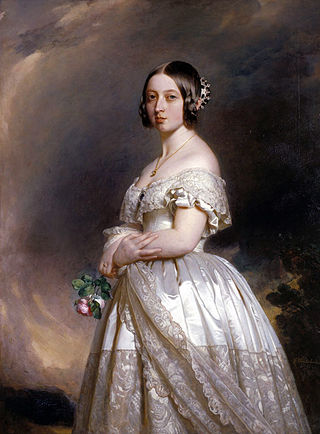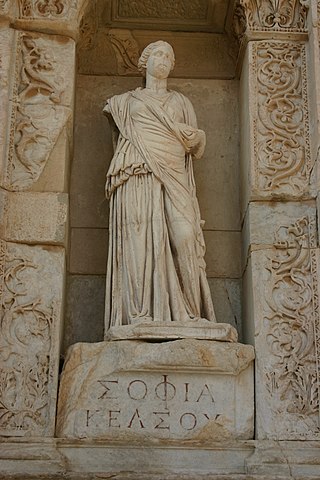
Chloe, also spelled Chloë, Chlöe, or Chloé, is a feminine name meaning "blooming" or "fertility" in Greek. The name ultimately derives, through Greek, from the Proto-Indo-European root *ǵʰelh₃-, which relates to the colors yellow and green. The common scientific prefix chloro- derives from the same Greek root. In Greek the word refers to the young, green foliage or shoots of plants in spring.
Amy is an English feminine given name, the English version of the French Aimée, which means beloved. It was used as a diminutive of the Latin name Amata, a name derived from the passive participle of amare, “to love”. The name has been in use in the Anglosphere since the Middle Ages. It was among the 50 most popular names for girls in England between 1538 and 1700. It was popularized in the 19th century in the Anglosphere by a character in Sir Walter Scott's 1821 novel Kenilworth, which was based on the story of Amy Robsart. Enslaved Black women in the United States prior to the American Civil War were more likely to bear the name than white American women because slave masters often chose their names from literary sources. The name declined in use after 1880 but was revived due to the hit song Once in Love with Amy from the 1948 Broadway musical Where's Charley?. The name peaked in usage in the United States between 1973 and 1976, when it was among the five most popular names for American girls. It remained among the top 250 names for American girls in the early 2020s.
Amanda is a Latin feminine gerundive name meaning, literally, “she who must be loved”. Other translations, with similar meaning, could be "deserving to be loved," "worthy of love," or "loved very much by everyone." Its diminutive form includes Mandy, Manda and Amy. It is common in countries where Germanic and Romance languages are spoken.
Kaylee is a given name, most often for females. The name is a modern English combination of the name elements Kay and Lee.
Katie is an English female name. It is a form of Katherine, Kate, Caitlin, Kathleen, Katey and their related forms. It is frequently used on its own.

Victoria is a feminine first name. It is also used as a family name.
Lina is an international feminine given name. Languages of origin include: English, Italian, Turkish, Lithuanian, Russian, Sanskrit, Spanish, Swedish, Persian, Kurdish, Arabic. It is also the short form of a variety of names ending in -lina including Catalina, Angelina, Carmelina, Carolina, Emelina, Marcelina, Nikolina, Rosalina, Italina, and Žaklina. Lina is a Finnish, Italian, and Slovene feminine given name that is a feminine form of Lino, Lin, and Linus.

Yasmin is usually a feminine given name, sometimes also a surname. Variant forms and spellings include Yasemin, Yasmeen, Yasmina, Yasmine, and Yassmin.

Samantha is a feminine given name.
Danielle is a modern French female variant of the male name Daniel, meaning "God is my judge" in the Hebrew language.

Renée is a French feminine given name and surname.
Tara is a given name with multiple meanings in different cultures.

Holly is an English-language surname and given name.
Hayley is an English given name. It is derived from the English surname Haley, which in turn was based on an Old English toponym, a compound of heg "hay" and leah "clearing or meadow".

Sophia, also spelled Sofia, is a feminine given name, from Greek Σοφία, Sophía, "Wisdom". Other forms include Sophie, Sophy, and Sofie. The given name is first recorded in the beginning of the 4th century. It is a common female name in the Eastern Orthodox countries. It became very popular in the West beginning in the later 1990s and became one of the most popularly given girls' names in the Western world in the first decades of the 21st century.

Tiffany is a primarily English feminine form of the Greek given name Theophania. It was formerly often given to children born on the feast of Theophania, that is, Epiphany. The equivalent Greek male name is Theophanes (Θεοφάνης), commonly shortened to Phanis (Φάνης) and the female is Theophania (Θεοφανία) or Theophano (Θεοφανώ), colloquially Phani (Φανή).

Stephanie is a female name that comes from the Greek name Στέφανος (Stephanos) meaning "crown, wreath, garland". The male form is Stephen. Forms of Stephanie in other languages include the German "Stefanie", the Italian, Czech, Polish, and Russian "Stefania", the Portuguese Estefânia, and the Spanish Estefanía. The form Stéphanie is from the French language, but Stephanie is now widely used both in English- and Spanish-speaking cultures.

Emma is a feminine given name. It is derived from the Germanic word ermen, meaning "whole" or "universal". It likely originated as a short form of names such as Ermengarde or Ermentrude. Its earliest use begins at least from the early seventh century, with Frankish royal daughter Emma of Austrasia and the wife of Eadbald of Kent found in written sources. Its popularity in the medieval era increased because it was the name of Emma of Normandy, mother of Edward the Confessor. Emmeline is a Norman variant of Emma that was introduced to England by the Norman invaders in the 11th century. The name is etymologically unrelated to Amalia, Amelia, Emilia, and Emily, all of which are derived from other sources, but all of these names have been associated with each other due to their similarity in appearance and sound. Emma has been used as a short form of some of these names or shares diminutives such as Em or Emmy with them.
Jamila (Arabic: جميلة) is a feminine given name of Arabic origin. It is the feminine form of the masculine Arabic given name Jamil, which comes from the Arabic word jamāl, meaning beautiful. The name is popular on a global scale, in regular use by both Arabic speaking and non–Arabic speaking populations and holds religious significance for some Muslims. Due to differences in transcription, there are several variations on how to spell the name.
Jasmina, sometimes Jasminka, as a feminine variant, and Jasmin, sometimes Jasminko, as a masculine variant, are given names used in Bosnia and Herzegovina, Croatia, Macedonia, Montenegro, Serbia, Bulgaria and Slovenia, and same as a given name Jasmine, which is the common form in German, Romance and English-speaking countries, although almost always as a feminine variation.










